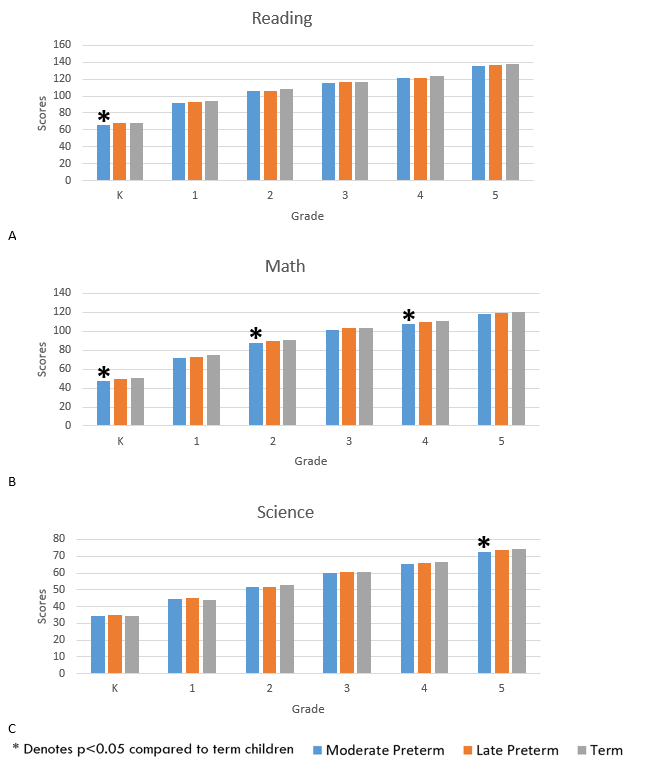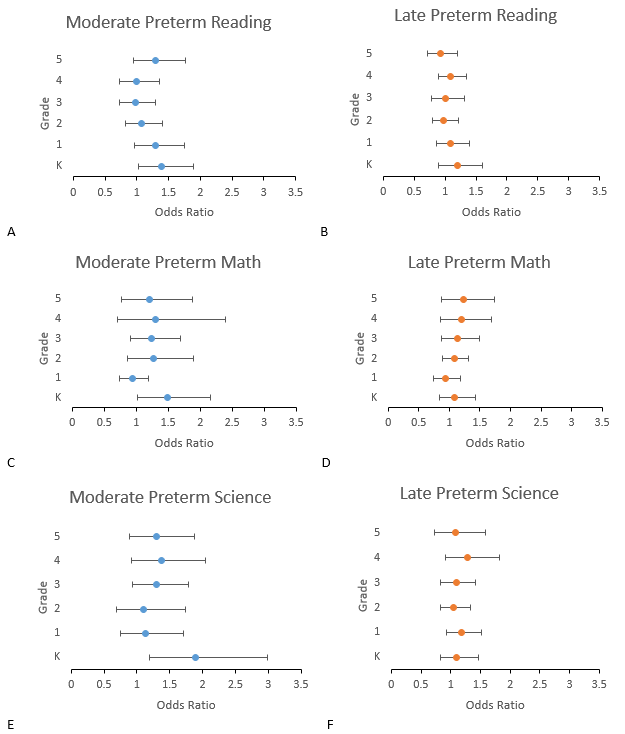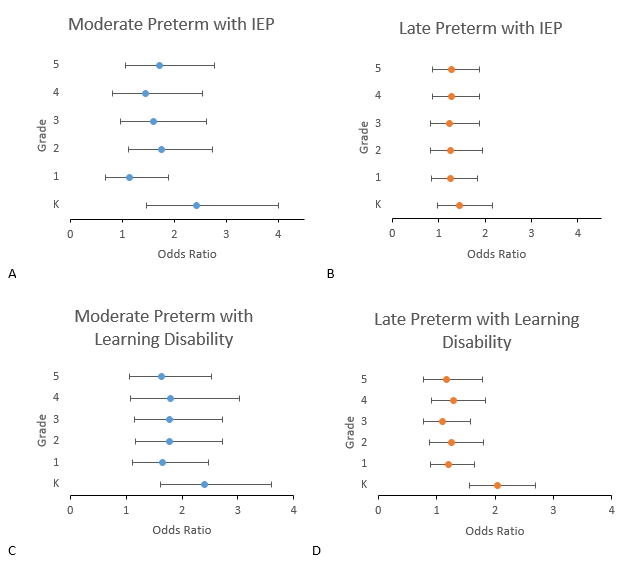Back
Background: One in ten infants in the United States is born preterm, or less than 37 completed weeks of gestation. Despite the many preventive efforts in neonatal intensive care units and developmental clinics for preterm infants, studies have shown that preterm infants continue to have learning difficulties and decreased school performance, even in the children born moderate and late preterm (32 to 36 completed weeks’).
Objective: To determine whether preterm birth of 32-36 6/7 weeks gestation affected school outcomes from kindergarten through fifth grade.
Design/Methods: Using the Early Childhood Longitudinal Study (ECLS) Kindergarten class of 2011 cohort database sponsored by the National Center for Education Statistics within the U.S. Department of Education, we identified 14,350 full term infants and 1,195 moderate and late preterm infants to include in the analysis. Students were tested each year through direct academic assessments in reading, math, and science, created by the study. All parents filled out survey information to evaluate demographic data. Teachers and schools provided information on student performance in the classroom and individual disabilities and education plan needs. All data were weighted to be representative of the U.S. population. All data analysis was done using SAS version 9.4.
Results: Infants who were born preterm between 35 and 36 6/7 weeks gestation had no significant difference in their academic scores or performance in reading, math, and science compared to term children. Infants who were born between 32 and 34 6/7 weeks gestation had lower standardized academic scores in reading in kindergarten, math in kindergarten, second, and fourth grade, and science in fifth grade, when compared to term children (Figure 1). Both moderate and late preterm children had higher odds of being below grade performance compared to peers (Figure 2), requiring an individualized education plan, and having a learning disability diagnosis (Figure 3).
Conclusion(s): These data align with previous studies that prematurity is a risk factor for long term academic complications, with additional reassurance that infants born after 34 weeks gestation appear to do just as well as term infants in school performance. However, late preterm children are at risk for learning disabilities and likely benefit from continued support and services to help them achieve throughout school.



Neonatal Follow-up
NICU Follow Up and Neurodevelopment 4: Very Long and Long Term Follow-Up
139 - Academic Performance in U.S. Moderate and Late Preterm Children: Are They Catching Up?
Sunday, April 30, 2023
3:30 PM – 6:00 PM ET
Poster Number: 139
Publication Number: 139.362
Publication Number: 139.362
Nicole Lock, University of Virginia School of Medicine, Charlottesville, VA, United States; Mark D. DeBoer, University of Virginia, Charlottesville, VA, United States; Rebecca Scharf, University of Virginia School of Medicine, Charlottesville, VA, United States; Sarah Miller, University of Virginia School of Medicine, Charlottesville, VA, United States

Nicole Lock, DO (she/her/hers)
Neonatal-Perinatal Fellow
University of Virginia School of Medicine
Charlottesville, Virginia, United States
Presenting Author(s)
Background: One in ten infants in the United States is born preterm, or less than 37 completed weeks of gestation. Despite the many preventive efforts in neonatal intensive care units and developmental clinics for preterm infants, studies have shown that preterm infants continue to have learning difficulties and decreased school performance, even in the children born moderate and late preterm (32 to 36 completed weeks’).
Objective: To determine whether preterm birth of 32-36 6/7 weeks gestation affected school outcomes from kindergarten through fifth grade.
Design/Methods: Using the Early Childhood Longitudinal Study (ECLS) Kindergarten class of 2011 cohort database sponsored by the National Center for Education Statistics within the U.S. Department of Education, we identified 14,350 full term infants and 1,195 moderate and late preterm infants to include in the analysis. Students were tested each year through direct academic assessments in reading, math, and science, created by the study. All parents filled out survey information to evaluate demographic data. Teachers and schools provided information on student performance in the classroom and individual disabilities and education plan needs. All data were weighted to be representative of the U.S. population. All data analysis was done using SAS version 9.4.
Results: Infants who were born preterm between 35 and 36 6/7 weeks gestation had no significant difference in their academic scores or performance in reading, math, and science compared to term children. Infants who were born between 32 and 34 6/7 weeks gestation had lower standardized academic scores in reading in kindergarten, math in kindergarten, second, and fourth grade, and science in fifth grade, when compared to term children (Figure 1). Both moderate and late preterm children had higher odds of being below grade performance compared to peers (Figure 2), requiring an individualized education plan, and having a learning disability diagnosis (Figure 3).
Conclusion(s): These data align with previous studies that prematurity is a risk factor for long term academic complications, with additional reassurance that infants born after 34 weeks gestation appear to do just as well as term infants in school performance. However, late preterm children are at risk for learning disabilities and likely benefit from continued support and services to help them achieve throughout school.



